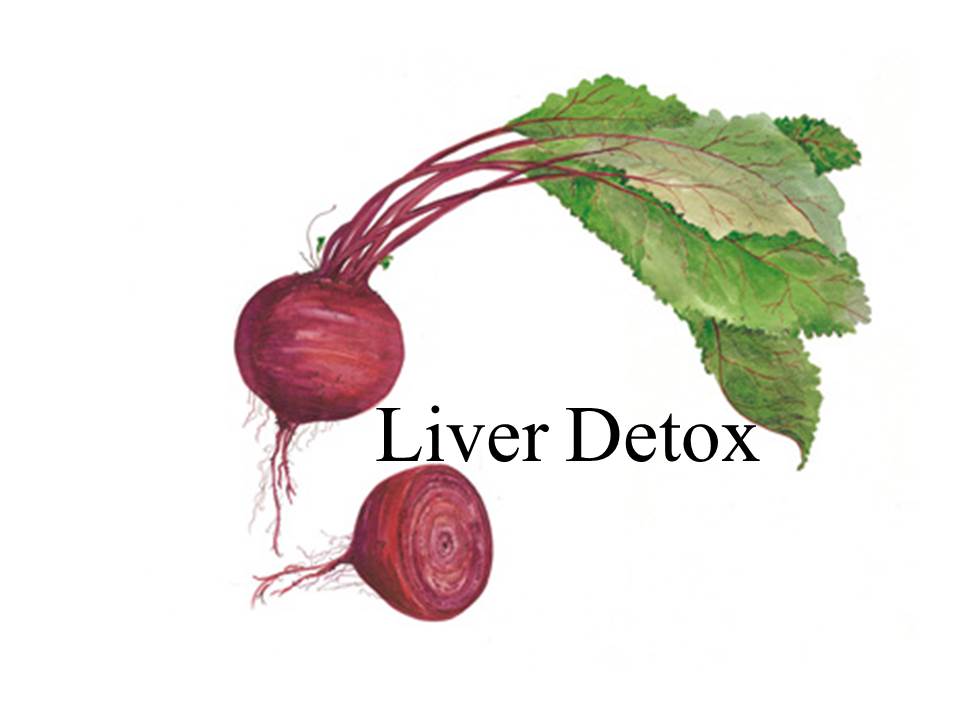The liver is THE hard-working organ in the human body and the second largest; the first being our skin. It performs many functions that are vital to life. The liver is responsible for hundreds of processes in the body; yes you read that right! By far the most important function is that of detoxification.
The liver is one of the most important organs in the body when it comes to detoxifying toxins, but not the only one. The liver converts fat soluble toxins into water soluble substances that can be excreted in the urine or the bile. Many of the toxic chemicals that we encounter in our environment, food, beauty products, etc. are fat-soluble, which means they dissolve only in fatty or oily solutions and not in water. This makes them difficult for the body to excrete. What happens if they are not excreted in a timely manner from the body? They are stored…sometimes for YEARS only to be released during times of intense exercise, extreme stress or juice/water fasting. During the release of these toxins, several symptoms such as: headaches, poor memory, stomach pain, nausea, fatigue, dizziness and palpitations can occur.
In addition to the role of detoxifier; the liver also plays an important role in:
- Cleansing your blood and returning it to the heart
- The liver stores glucose when it is in excess after you eat and releases that glucose in the blood when needed. This is an important function which when impaired during liver disease, results in hypoglycemia (low blood glucose).
- Liver plays important role in hormonal modification and inactivation. Liver stagnation may cause hormonal imbalances, particularly excess estrogen.
- Most drugs are metabolized by the liver.
IF the liver is overloaded with toxins and unable to function at optimal levels, “liver stagnation” can result in:
- Abdominal bloating
- Anxiety
- Irritability
- Menstrual disorders
- PMS disorders
- Stress disorders
- Chronic fatigue
- Inability to lose weight
- Sensitivity to chemicals
So what can you do?
The first step is to remove or reduce exposure to toxic food and drink:
- Alcohol
- Preservatives
- Dyes
- Pesticides and Fertilizers
- Heavy metal in large fish – stick to wild caught salmon
- Contaminated water – invest in a filtration unit
- Chlorinated and brominated products (found in almost all commercially produced breads and bread products)
- Switch to non-toxic and plant-based, cleaning and personal care products such as vinegar, lemon juice and essential oils
- Your skin is the largest organ of your body so do not put anything on your body that you would not put in your body

The second step is to pay attention to what you do eat:
- Eliminate processed foods, simple carbohydrates and sugar. A good motto is “Do not eat from a box.”
- Focus on eating more organic produce.
- Eliminate toxic, poor quality fats like canola oil, soybean oil, corn oil.
- AVOID GMO’s. Do not eat animal products from animals fed genetically modified feed such as soy, corn, and wheat.
- Eat the rainbow of fruits and vegetables every day. Aim for a minimum of 60% of your daily intake of food to be raw.
Let’s talk some specifics….
Lemon juice
The juice of half a lemon in hot water first thing in the morning is a perfect way to start the day; and is an excellent wake up call for the liver. The sourness of lemons triggers nerve and hormone activation to the liver and digestive system. Hot lemon water is also very helpful for those who suffer from sluggish bowel.
Beets
Beets are amazing for liver detox. They have the ability to help thin your bile, which allows the body to detox more efficiently. A common problem is sluggish/stagnant bile flow. Regular beet consumption (and a wealthy diet) can help strengthen natural detox!
Turmeric
Turmeric is superb for inflammation of all kinds in the body; liver included. Cooking with it is helpful, but not enough in this circumstance and a quality supplement is recommended.
Dandelion Root Tea
Dandelion root is excellent for liver health. It works by promoting the flow of bile and purifying out blood. It is a great alternative to coffee.
Milk Thistle
Milk thistle (silymarin) is a flowering herb related to the daisy and ragweed family. (Those allergic to ragweed should avoid) Milk thistle helps to purify the liver. Some reports suggest milk thistle may offer a possible benefit for people whose liver is damaged by industrial toxins, such as toluene and xylene. (WebMD)
Brussel Sprouts
Brussels sprouts are high in sulfur, which helps to remove toxins from the blood. Eating a serving or two of brussel sprouts daily will help sponge out toxins – whether they’re environmental or dietary. These little sprouts also boost glucosinolate, an antioxidant that forces the liver to release enzymes that block damage.
Glutathione rich foods
Carrots, tomato, grapefruit, walnuts, cooked spinach, and avocados are rich in glutathione; a protein that helps to detoxify the liver. Glutathione sticks to the toxins and sweeps them out of the body very efficiently.
As you can see, if you are showing signs of liver stagnation, there are plenty of things that you can do to help rectify the situation. Our body has amazing healing powers when we support it properly.
http://www.webmd.com/heart-disease/milk-thistle-benefits-and-side-effects
Please note that I am not a medical practitioner. The content of this website is provided for general informational purposes only and is not intended as, nor should it be considered a substitute for, professional medical advice. Do not use the information on this website for diagnosing or treating any medical or health condition. If you have or suspect you have a medical problem, promptly contact your professional healthcare provider. By using this website, you assume full responsibility and liability for your own actions.





